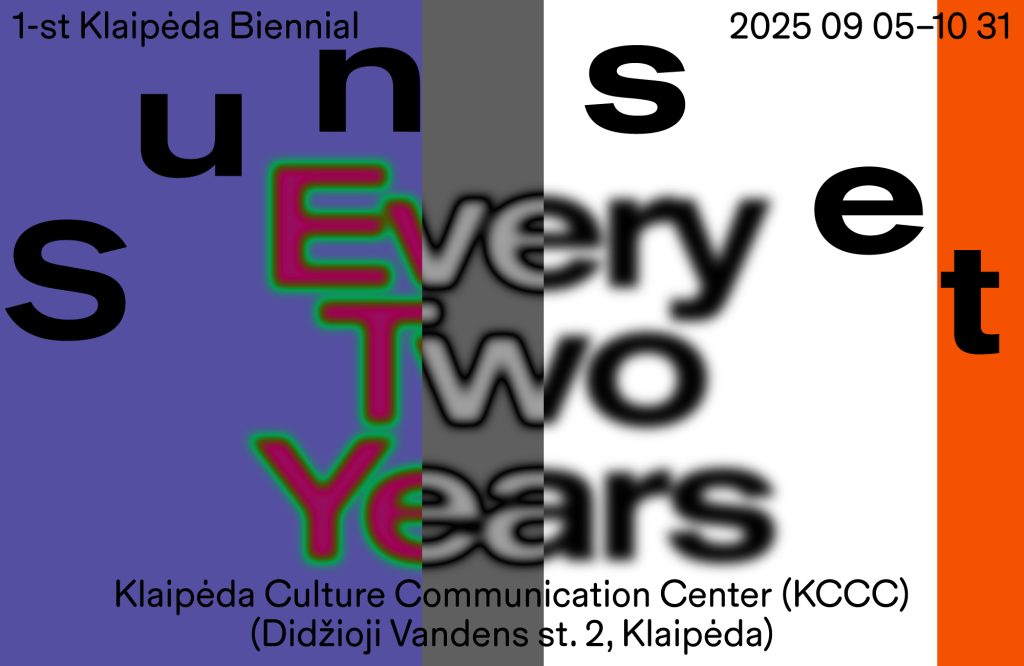
This autumn, the Klaipėda Culture Communication Centre (KKKC) will present its inaugural biennial, ‘Sunset Every Two Years’, taking place at KKKC and across various public spaces in Klaipėda. Organised in partnership with the Contemporary Art Centre, the biennial is curated by CAC director, Valentinas Klimašauskas.
‘Transit’ (from the Latin transitus – meaning passage or change) serves as the keyword of the upcoming Biennial, referring to an intermediate state of transition and transformation. This concept unfolds through several interconnected sub-themes:
First (1), the Biennial itself – by its very nature, an event that occurs every two years – functions as a transient, recurrent phenomenon. In astronomy, transit refers to the movement of one celestial body across another. The title Sunset Every Two Years poetically evokes a sense of extended, frozen, desynchronised time. It gestures both to modernity as a contradictory period, connecting different worldviews and temporalities, and to Klaipėda itself, often referred to as ‘the city of sunsets’. As a transit phenomenon, the Biennial offers an opportunity to experience the intersections between planetary and personal time and the field of art.
Second (2), the figure of transit addresses the space of the distinctive and dramatic history of the greater Klaipėda region, shaped by a century of significant political, urban, and other transformations. This is reflected in the Biennial’s attention to the past, particularly through historical and other forms of photography.
Third (3), Klaipėda is a port city, a hub of transit, relocation, and logistics – moving freight, passengers, and ferries. In Ancient Greek, the word ‘metaphor’ (μεταφορά) means transference or relocation: this notion becomes both a poetic and curatorial strategy within this context. The integration of poetic language into curatorial and architectural processes is one of the key intentions of this Biennial. The exhibition will feature a number of existing works, some of which may have been previously exhibited – their relocation, transit, and the creation of new semantic connections are an integral part of the Biennial.
Fourth (4), the region’s ecospace is closely tied to ecological and political movements and early examples of contemporary art in Lithuania, such as the campaign-performance Angakoko sugrįžimas (Return of Angakokas) by the artist group Žalias lapas (Green Leaf) in Nida in 1990, protesting against oil drilling in the Baltic Sea, and the National Park Status to Neringa campaign (Nida, 1989), among others. Taking into account the danger of chemical weapons buried in the Baltic Sea, the spills of various pollutants, radical historical and contemporary political and other movements, as well as the sea’s current status as one of the most polluted bodies of water in the world, the Biennial seeks to draw attention to various notions of ecological and other toxicity.
Fifth (5), and finally, this unique ecosystem of the ‘sunset land’ is also an actively regenerative space of rest, wellness, sexuality, and bodily or spiritual rebirth. As a seaside resort or a magical ‘edge of the world’, it offers the sensation of time slowing down, of liberating political or sexual bodies, and of opening up the possibility for new worlds and experiences.
Through these lenses, the Biennial will explore transit as a historical, logistical, socio-economic, ecological, extractivist, aesthetic, magical, and poetic theme for possible speculative futures.
The 1st Klaipėda Biennial (KB1) emerges in response to a lack of large-scale, recurrent, discursive contemporary art events in Western Lithuania. The international KB1 will take place across the premises of the Klaipėda Cultural Communication Centre (KCCC) and the city’s public spaces, with a special focus on the maritime region of Klaipėda, its history, and the countries along the shores of the Baltic Sea.
The first KB1 is curated by Valentinas Klimašauskas, who has extensive experience in curating major international events, including the national pavilions of Latvia (2019) and Lithuania (2024) at the Venice Biennale, the Coast Contemporary Contemporary Art Festival in the Lofoten Islands, Norway (2023), and the 14th Baltic Triennial at the Contemporary Art Centre in Vilnius (CAC) (2021), among other projects. Klimašauskas is currently the Director of the CAC in Vilnius.
The long-term aim of the project is to establish a sustainable, large-scale international contemporary art event in Western Lithuania, fostering collaboration among artists and partner institutions from Northern Europe, the Baltic States, and beyond.
Locations of the Biennial: Klaipėda Cultural Communication Centre (KCCC) and public spaces across Klaipėda.